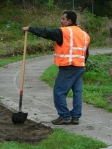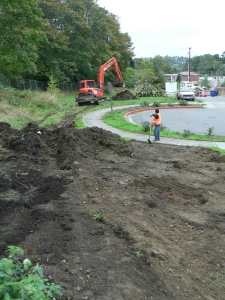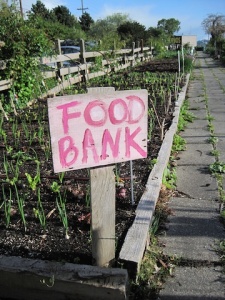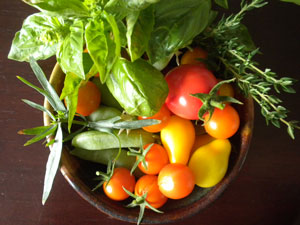Posted on July 15, 2013 by Liz Reed Hawk

Solid Ground’s Community Report 2012
Hot off the press! Solid Ground’s report to our community on our 2012 work and accomplishments is now available. “Breaking the cycle of generational poverty” reports on recent impacts we’ve made in our community. But it also highlights the long-term positive change our programs can have in the lives of the people who access our services, and the ripple effect this has on their children’s lives.
As Solid Ground approaches our 40th anniversary, we remain focused and committed to our mission to end poverty in our community, and to help our society become one without racism and other oppressions.
Our engagement in this work is only possible through the support of passionate and committed employees, donors, volunteers, and government and nonprofit partners. With this continued support, we look forward to working ever more purposefully to help families and individuals overcome the challenges of living in poverty and progress to a place of thriving.
Feel free to share “Breaking the cycle of generational poverty” with others who may be interested in our work. If you’re not already on our mailing list and would like a hard copy of the report mailed to you, please email your mailing address to publications@solid-ground.org.
Filed under: Solid Ground News | Tagged: advocacy, affordable housing, AmeriCorps, breaking the cycle of generational poverty, Brettler Family Place, community building, Community Report, Fair Housing, gardening, homeless prevention, Housing, hunger, landlord tenant disputes, Lettuce Link, Marra Farm, Statewide Poverty Action Network, tenant services | Leave a comment »
Posted on May 22, 2013 by Mike Buchman

Clean radishes
Here’s a breaking news update on the Senate Farm Bill and the latest message (from the Anti-Hunger & Nutrition Coalition) to deliver to our Senators. Please pick up a phone to call Senators Cantwell and Murray.
Please share this information with your networks:
Farm Bill Process
The Senate began their debate of amendments to the Farm Bill yesterday morning. Unfortunately, they missed their biggest and best opportunity to help hungry families and seniors by rejecting the Gillibrand amendment that would have eliminated the $4.1 billion cut to SNAP. Senator Murray co-sponsored the amendment and Senator Cantwell voted for the amendment. But in the end, the amendment failed to get 50 votes on the Senate floor, ultimately defeated by a vote of 26 yeas to 70 nays.
If there’s a bright side to this, the Senate also defeated a number of even more damaging amendments proposed by Senator Roberts that would have tried to instill many of the cuts proposed in the House Bill, including an amendment that would have greatly restricted Categorical Eligibility and eliminated Heat and Eat entirely.
Additionally, Senator Brown has introduced an amendment that will be debated on the floor that would add $10 million to the Senior Farmers Market Nutrition Program as well as add funds to other programs that help farmers markets and increase access to nutritious, locally sourced produce. This is an effort that we support since the Senior FMNP helps low-income seniors have access to the fresh produce that they need to stay healthy in body and mind, but $10 million will be a tiny drop in the bucket compared to the cut to SNAP — our first-line defense against hunger.
Even if this amendment is added to the bill, the Senate will be voting on a final package as soon as tonight, or possibly tomorrow morning, that will cut SNAP by over $4 billion — a cut that will take $90 per month out of the SNAP benefits for 232,000 households in Washington.
Tell Senators: Support the Brown Amendment but Vote NO on the Final Farm Bill
Call Senator Cantwell and Senator Murray now and ask them to support the Brown amendment. Let them know that we support adding funding to the Senior Farmers Market Nutrition Program, because if the cuts to SNAP proposed in this Farm Bill take effect, then we need to make sure that seniors have all the assistance they can get to have access to nutritious food that they can’t otherwise afford on a fixed income.
We need this amendment to get the final Farm Bill package in the best shape in can be should it pass the rest of the Senate, but in the end, we still need our Senators to vote NO to the final Farm Bill package, because the proposed cuts to SNAP are unconscionable. No Farm Bill this year is better than living with the consequences of a Farm Bill that slashes SNAP and as a result, increases poverty for hungry families with children and seniors. The Senate can always go back to the drawing board and save their yes vote for a Farm Bill that does not make unconscionable cuts to SNAP.
Senator Murray: 1.866.481.9186
Senator Cantwell: 1.202.224.3441
• Vote YES on the Brown amendment to increase funding for Senior Farmers Market Nutrition Program.
• Even if that amendment passes, vote NO on the final Farm Bill because of the unconscionable cut to SNAP — our first line of defense against hunger.
Filed under: Political Action | Tagged: Farm Bill, Food & Nutrition, food justice, gardening, grassroots politics, Lettuce Link, Marra Farm, sustainable agriculture | Leave a comment »
Posted on October 29, 2012 by Liz Reed Hawk

Seattle Community Farm panorama (all photos by John Bolivar, jbphotography.com)
On one of the first cool, drizzly fall days following this year’s record-breaking dry Seattle summer, local photographer John Bolivar visited our Lettuce Link program’s Seattle Community Farm at Rainier Vista to help us document 2012’s lush harvest. Although Farm Coordinator Scott Behmer claimed the harvest was beginning to wane, we still witnessed as Scott, Lettuce Link VISTA Amanda Lee and a community volunteer gathered and washed scores of pounds of beets, squash, heirloom tomatoes, radishes and greens.
This is the Seattle Community Farm’s second growing season, and according to the Lettuce Link Blog, more than 7,000 pounds of produce had been harvested and donated to the Rainier Valley Food Bank as of early October 2012 (more than twice last year’s harvest, when the Farm was still getting established). Enjoy this slideshow of the bounty!
This slideshow requires JavaScript.
Filed under: Food & Nutrition | Tagged: Food & Nutrition, food justice, gardening, John Bolivar Photography, Lettuce Link, Rainier Vista, Seattle Community Farm | Leave a comment »
Posted on August 14, 2012 by Kathleen Penna
This post, written by Scott Behmer, Seattle Community Farm Coordinator, originally appeared on the Lettuce Link blog.

Dance of the honey bees
We recently acquired a new addition to the Seattle Community Farm. Well, thousands of new additions actually. The Seattle Community Farm is now home to two colonies of honey bees!
Honey bees, along with birds and bats, pollinate over one-third of the food that humans eat. Without honey bees it wouldn’t be just honey that we would miss, but many fruits, nuts and vegetables.
To prepare for the bees’ arrival, we built a small enclosure for the hives so people can view the hives up close without having bees fly in their faces. The enclosure also prevents people from accidentally bumping the hives.
The bees came from an apiary in California, by way of the Beez Neez in Snohomish. They arrived in a wood and mesh package that contained:
- Three pounds of worker bees
- One queen bee
- Food for the bees during their travels
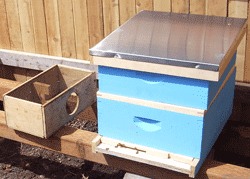
Blue bee hive
After we picked up the bee packages, we dumped them into their new hives, gave them some food to get started, and let them do their thing.
There are three types of honey bees:
- Drones are the male bees. Every day they fly around and look for a queen bee to mate with. Drones are only a small percentage of the bees in the hive.
- Worker bees are underdeveloped female bees. They are the majority of the bees in the hive, and they do many different tasks. The worker bees gather nectar and pollen from flowers, raise the young bee larva, and defend the hive from intruders.
- Queen bees are fully developed female bees. A bee colony usually has only one queen bee, and she lays all of the eggs. A queen bee can lay 1,500 eggs in a single day!
Our new bees will pollinate flowers and crops in the surrounding area, provide a great learning tool, and (we hope) give us some sweet honey.
Interested in beekeeping? The Puget Sound Beekeepers Association, Urban Bee Project, and Seattle Tilth’s Backyard Beekeeping 101 class are great places to start!

A bazillion bees!
Filed under: Food & Nutrition | Tagged: bees, Food & Nutrition, food security, gardening, honey bees, Lettuce Link, Seattle Community Farm | Leave a comment »
Posted on July 27, 2012 by Kathleen Penna
This post, written by Jessica Sherrow, a Harvest Against Hunger Summer VISTA with Lettuce Link, originally appeared on the Lettuce Link blog. Lettuce Link is one of several partners stewarding original urban farmland at Marra Farm in Seattle’s South Park neighborhood.

A handful of carrots!
Marra Farm is a place that defies stereotypes. The word ‘farm’ even takes on a new meaning when applied to our little agricultural oasis in South Park. The images associated with that word – solitary, quiet, pastoral – dissolve when you step onto our farm.
Truthfully, it can be a little chaotic. Kids from Concord International Elementary or the South Park Community Center running around; a few dozen of our 1,800 annual volunteers working and digging and planting; planes, trains and cars filling the air with that distinct urban din – it’s not at all what you would expect on a farm.
So, true to form, Marra Farm manages to do what many parents thought impossible: It makes kids love vegetables. It’s a bold statement, we know. But it’s a hard thing to deny when a 5-year-old, while pulling one carrot out of the ground and simultaneously munching on another exclaims,
I WANT TO EAT ONE MILLION CARROTS!!!!”
And when you think about everything these kids experience throughout the growing season, it makes perfect sense. They dig in the dirt and plant seeds. They water to their heart’s content, and then they watch their little plants grow.
 They harvest the veggies themselves – chard, sweet peas, carrots, broccoli – and help prepare a snack especially for them. Today, it’s Chinese Veggies and Rice, and it’s a hit.
They harvest the veggies themselves – chard, sweet peas, carrots, broccoli – and help prepare a snack especially for them. Today, it’s Chinese Veggies and Rice, and it’s a hit.
We can’t help but wonder, then, if all children are secretly veggie-lovers? It appears the only thing kids need is a little involvement in their food – planting a seed or chopping a leaf – anything to make it more fun, more exciting, and more delicious. After all, if we can get a 3rd grader to eat kale, the sky truly is the limit…
For more information on gardening and cooking with kids, check out these amazing projects: Lettuce Link’s Seattle Community Farm, GRuB: Growing Healthy Food, People, and Communities, Seattle Youth Garden Works, Seattle Tilth, and The Edible Schoolyard Project.

Many hands, cleaning carrots
Filed under: Food & Nutrition | Tagged: children, Food & Nutrition, gardening, hunger, Lettuce Link, Marra Farm, urban ag | 1 Comment »
Posted on January 6, 2012 by Mike Buchman
Editor’s note: This post originally appeared on the Lettuce Link blog.
 Welcome to 2012! On these gloomy January days (when we are rather glad to be warm and dry indoors instead of out in the garden), it’s a good time to pause and take stock of where Lettuce Link has been and where we’re going.
Welcome to 2012! On these gloomy January days (when we are rather glad to be warm and dry indoors instead of out in the garden), it’s a good time to pause and take stock of where Lettuce Link has been and where we’re going.
So, without further ado, here are a few of our accomplishments in 2011, made possible by the help of our generous volunteers (over 9,329 volunteer hours!) and financial supporters:
- Provided seeds, plant starts and gardening information for 3,695 food bank clients at 23 different locations.
- Supported gardeners at 49 P-Patches to grow and share over 17,000 pounds of organic produce for food banks and meal programs (with only half of the gardens reporting).
- Distributed seeds, starts and resources to 13 community gardens at schools, low-income apartments, food banks and churches.
- Despite a chilly spring and summer, grew 18,594 pounds of organic produce in the Lettuce Link Giving Garden at Marra Farm to donate to the Providence Regina House and Beacon Avenue food banks.
- Helped develop and provided seasonal vegetables for South Park’s first Community Kitchen.
- Held community meetings and garden classes (in five languages); built a shed, fences and tables; and planted, tended and grew 3,023 pounds of vegetables for the Rainier Valley Food Bank and community work-trade participants in our inaugural season at the Seattle Community Farm!
- Taught nutrition, organic gardening and ecology at the Seattle Community Farm and Marra Farm, reaching over 170 children.
- Harvested 4,605 pounds of local fresh fruit for food banks and meal programs across the city, food that would otherwise have gone to waste.
- Held events to raise $20,000 in needed funds. Thank you Friends of Lettuce Link!
- Partnered with Clean Greens, Delridge Neighborhood Development Association, Just Garden Project, Seattle Tilth, UW Department of Urban Design and Planning, Seattle Works, King County Food and Fitness Initiative, the Community Alliance for Global Justice and many others on projects that will increase access to healthy foods for everyone.
And yet, as we catch our breath this winter after a busy year, we’ve found ourselves at a bit of a crossroads. Fewer grants, budget cuts and belt-tightening measures provide an opportunity to reassess our work: What are our program’s strengths? What do we do that’s unique? How can we continue to grow and change our program to meet community needs, provide wrap-around services for Solid Ground participants, and further our anti-racism work?
These are not easy questions, but we’re committed to working through them with your support. Here are a few exciting projects to keep an eye out for in 2012:
- Building an overhead structure at the Seattle Community Farm, which will allow protection from the elements and make the space more conducive to community gatherings.
- Expanding our CSA project at Marra Farm, to both raise funds for our program and offer a sliding-scale subscription to our neighbors.
- Advocating for just food policies on the city, state and federal levels. Watch the Lettuce Link blog for details in the next few days!
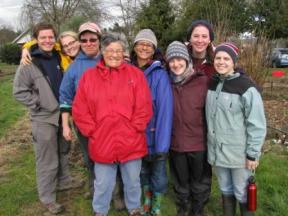
Thank you for your time, resources and support both this past year and as we boldly stride into 2012 – pushing a wheelbarrow and wearing our rainboots!
The Lettuce Link team – Michelle, Sue, Scott, Robin, Amelia, Mariah and Blair (with much gratitude to Molly, Kate, Andrea, Sophie and Alice – our staff, AmeriCorps volunteers and interns who have moved on to new adventures).
Filed under: Food & Nutrition | Tagged: community building, community fruit tree harvest, community gardening, Food & Nutrition, food bank, gardening, Lettuce Link, Marra Farm, P-Patch, sustainable agriculture | 1 Comment »
Posted on October 20, 2011 by Rose Marcotte
Solid Ground’s Lettuce Link program invites you and yours to Marra Farm in South Park to celebrate national Food Day on Monday, October 24. We will explore the crops in our Giving Garden, learn about the rich traditions of farming and community in South Park, and discuss Lettuce Link and Solid Ground’s broader mission to end hunger,  poverty and oppression in Seattle. We also will press apples into fresh cider, save seeds for next year, and lead a tour of this community-powered sustainable urban farm. In addition, students from Concord International Elementary will harvest the pumpkins they planted in the Giving Garden last spring. Please dress for the weather, as there is little covered space at the Farm.
poverty and oppression in Seattle. We also will press apples into fresh cider, save seeds for next year, and lead a tour of this community-powered sustainable urban farm. In addition, students from Concord International Elementary will harvest the pumpkins they planted in the Giving Garden last spring. Please dress for the weather, as there is little covered space at the Farm.
Food Day seeks to bring together Americans from all walks of life — parents, teachers and students; health professionals, community organizers and local officials; chefs, school lunch providers and eaters of all stripes — to push for healthy, affordable food produced in a sustainable, humane way. Visit the Food Day website for more events and information.
What: Food Day
Date: Monday, October 24
Time: 10 am – noon
Location: Marra Farm, 9026 4th Ave S Seattle, WA 98108
RSVP: RSVPs appreciated — sign up on the Food Day registration page
Getting there: Bus routes and driving directions to Marra Farm
Filed under: Food & Nutrition | Tagged: Food & Nutrition, food justice, gardening, Lettuce Link, Marra Farm | Leave a comment »
Posted on July 19, 2011 by Liz Reed Hawk
(Editor’s note: This is the main story reprinted from our July 2011 Groundviews newsletter. To read the complete newsletter or past issues of Groundviews, please visit our Publications webpage.)

On a cool, drizzly June day, Sudi convinced his 7-year-old brother to join him at a work party at the new farm nestled within their housing complex. They helped move the last load of dirt into neat rows, soon to be planted. Scott Behmer, Seattle Community Farm Coordinator, says that when he started in the fall of 2010, the Farm was little more than “a grass field and a parking lot” near Rainier Vista (a mixed-income housing community just off MLK Way in South Seattle). Today, after two+ years of planning, community meetings and “a lot of physical work moving in 200 cubic yards of soil and tens of thousands of pounds of other materials,” the 1/3-acre Farm is fully planted and celebrated its official Grand Opening on June 25.
Seattle Community Farm is the newest project of Solid Ground’s Lettuce Link program, which works with and in communities to grow and share fresh, nourishing food, and envisions a city where people have equal access to healthy and culturally appropriate food. Scott says, “Our goal is to get vegetables to folks who struggle to afford them.”
Cross-cultural community building
Getting the new Farm to where it is today has been a true organizing effort: Lettuce Link worked with many partners, including Seattle’s P-Patch Program, landscape designer Eric Higbee (who donated his services) and Seattle Housing Authority.
Lettuce Link Program Manager, Michelle Bates-Benetua, says, “Together, we crafted and carried out a culturally relevant engagement process so the community could tell us what they wanted. It may take longer and it is more expensive to provide food, childcare and interpretation, but our intent is to work together with the neighborhood so that in a few years, they run the Farm and we’ve worked ourselves out of a job.
“The grand vision is that the community is able to produce food together across cultures and language, share that food among themselves and with the Rainier Valley Food Bank, and utilize the gathering space as one community instead of several distinct groups living in one neighborhood.”
Mariah Pepper, an AmeriCorps*VISTA serving this year as Seattle Community Farm’s Outreach Coordinator, says, “It’s an interesting neighborhood; Rainier Vista is a mixed-income housing development, so there’s every kind of person you can imagine.” Residents run the gamut from Seattle Housing Authority seniors and people living on very low incomes, to Habitat for Humanity homeowners, to renters and homeowners affording full-market rates.
Seattle Community Farm is built on a Work Trade model Scott describes as “one way to try to make the volunteer model work for people where time might mean a lot more because they’re lower income and might work more jobs. Basically, if you work two hours, you get a bag of vegetables,” worth about $30/bag. “So you’re not just volunteering, you’re coming and working in exchange for vegetables.”
Michelle says, “The goal is to make sure our volunteer opportunities are accessible and meaningful for the community” – and yet this poses challenges. The Rainier Vista area is extremely culturally diverse: Residents speak approximately 50 different languages. Mariah says, “With so many languages and so many cultures, it makes outreach a bit difficult, because there are so many different ways that people interact with each other – and a sea of information. And that’s the thing we’ve all learned: We have to have multiple ways of getting information out there.”
When possible, staff use interpreters and have outreach materials translated into multiple languages. Scott says Rainier Vista has “a lot of community events. So we’re going to those, and going door to door, leaving flyers and talking to people.”
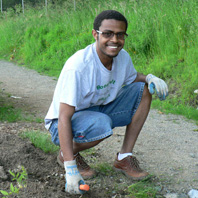
Sudi, a Seattle Community Farm volunteer and Rainier Vista resident
Good chemistry
Sudi is one young resident who both volunteers regularly and is helping get the word out to other residents. Originally from Ethiopia, his family has lived at Rainier Vista for six years. Having just finished his third year studying chemistry at St. Martin’s College, he says his dad asked him to come out to volunteer one day, and they happened to be doing a class on composting. “We talked about fertilizers and nitrogen, and so I get interested when I hear that!” Sudi says, “I think it is wonderful. Aside from just doing the work, you actually learn how to grow plants. We have fun talking about different kinds of plants, and it’s just a learning experience.
“I try to get people involved here in the neighborhood. Scott gave me flyers, and one day I took it down and gave it to some people – trying to explain the reason behind it. The reason why this is here, from my understanding, is this is a (mostly) vegetable garden – and trying to get more nutritions from vegetables into this community, who either don’t know much about the importance of it – or since vegetables are expensive, they don’t get much of it. Having it here, and them working on it and harvesting it themselves, is a big thing.”
Scott says, “It’s always great to get volunteers from the community to come out and work, and hear a little about them, and see them enjoy it.” Mariah adds: “Food is so connected to culture – so it’s a way to talk about how we grow things, how we cook things and eat things, and have a conversation across these differences. I would like to see the Farm be able to bridge that.”
For more information about the Seattle Community Farm, please contact 206.694.6828 or urbanfarm@solid-ground.org, or visit www.solid-ground.org/Programs/Nutrition/CommunityFarm.
Filed under: My Story | Tagged: Food & Nutrition, food justice, gardening, Lettuce Link, sustainable agriculture | Leave a comment »



















